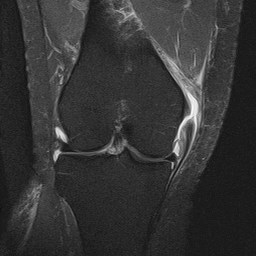MCL Ligament Injury
Background

The medial collateral ligament (MCL) is a band of tissue found on the inside part of the knee and originates on the medial epicondyle of the femur (inside of the femur) and inserts onto the medial condyle of the tibia (inside of the top of your shin bone). This ligament is a primary stabilizer of the knee and helps prevent the knee from buckling inwards.
MCL Injuries
Most injuries to the MCL occur when there is an outside force that causes the forces the knee inward or toward the other knee. Other activities such as cutting when you are running or jumping and landing awkwardly can also cause an injury. Injuries to the MCL are graded in accordance with their severity. The grade of injury is a function of the amount of opening of the joint on valgus stress at 0 and 30 degrees of flexion and quality of end point when the knee is stressed. The orthopedic team will examine your knee thoroughly to assess the MCL and may order an MRI to provide additional information regarding the integrity of the ligament.
Treatment
Treatment options depend on the severity of the injury. In grade I-II injuries, nonsurgical options are appropriate and include rest, ice, activity modification, bracing and even crutches. Grade I injuries usually heal in 1-2 weeks. Grade II injuries usually take 3-6 wks and may require the use of a brace and crutches to protect the healing ligament. Grade III injuries, or complete tears, may require surgery but in certain cases can be treated non-operatively. Factors affecting a surgical decision include location of the tear, activity of the individual, and associated injuries to name a few.
Postoperative Rehabilitation
The rehabilitation protocol will depend on the type of surgery performed. It is important to remember that a main goal of rehab is to protect the repair, restore knee function, then return to full activity. There is little to do to rush the healing and rehab process which will take several weeks. At roughly 20 wks postop, consideration for return to sport testing could be made.
